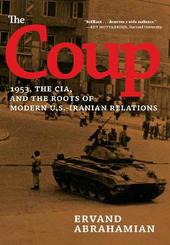
|
The Coup: 1953, The CIA, and The Roots of Modern U.S.-Iranian Relations
Hardback
Main Details
| Title |
The Coup: 1953, The CIA, and The Roots of Modern U.S.-Iranian Relations
|
| Authors and Contributors |
By (author) Ervand Abrahamian
|
| Physical Properties |
| Format:Hardback | | Pages:280 | | Dimensions(mm): Height 210,Width 140 |
|
| Category/Genre | History
Military history |
|---|
| ISBN/Barcode |
9781595588265
|
| Classifications | Dewey:955.053 |
|---|
| Audience | |
|---|
|
Publishing Details |
| Publisher |
The New Press
|
| Imprint |
The New Press
|
| Publication Date |
28 February 2013 |
| Publication Country |
United Kingdom
|
Description
From Ervand Abrahamian, a leading historian on the Middle East, comes a lucid account of the CIA's 1953 coup in Iran and how it paved the way to today's diplomatic gridlock. The Coup is the first trade book to put the 1953 coup in context, filling a gap in the understanding of Iran's history. Abrahamian relies on little-known archival information to position the coup and its aftermath in a new light, challenging conventional interpretations of the event and positioning it in the context of oil interests rather than the Cold War. A timely and eye-opening book.
Author Biography
Ervand Abrahamian is the author of several books, including Tortured Confessions, Khomeinism, Iran Between Two Revolutions, and A History of Modern Iran. He is Distinguished Professor of Iranian and Middle Eastern History and Politics at the City University of New York. He lives in Brooklyn.
ReviewsA Choice magazine Outstanding Academic Title selection "The CIA-sponsored coup in 1953 that deposed Muhammad Mossadeq, Iran's popular prime minister, is often noted as a failure of interventionist foreign policy. In this slim, readable volume, Iran scholar Abrahamian (A History of Modern Iran) delves into the genesis and aftermath of that operation, challenging the idea that Mossadeq's intransigence made the putsch inevitable. Making extensive use of recently declassified diplomatic cables and the archives of multinational oil companies especially the Anglo-Iranian Oil Company, now BP the author makes the case that the U.K. and the U.S., unwilling 'to back down over the hard issue of nationalization [of the oil industry]... were the main stumbling blocks' in the relationship between Iran and the West. . . . his primer skillfully weaves together primary sources to tell an engaging tale of the machinations, intrigues, and personalities at the heart of the crisis." Publishers Weekly "Abrahamian has done for Iran what de Tocqueville did for France." Edward Mortimer, author of Faith and Power: The Politics of Islam, on Ervand Abrahamian's A History of Modern Iran "A relevant, readable study of the foreign-engineered 1953 Iranian coup reminds us of the cause that won't go away: oil." Kirkus "In this thorough, well researched work, Abrahamian (Iranian & Middle Eastern history & politics, CUNY) breaks down the generally accepted understanding of the details behind the 1953 CIA run coup that ousted Iran's prime minister, Muhammad Mossadeq, and supported the shah. The author reveals some of the primary motivations behind the current Iranian hostility toward the United States and other Western governments. Through his well documented research, Abrahamian paints a picture of the coup in the context of British and U.S. oil interests, contrasting these motivations with the desire to curb the spread of Soviet influences. In his examination of information recently made available from the British Foreign Office, the U.S. Department of State, the Anglo Iranian Oil Company (now BP), and other government documents, Abrahamian pieces together the intricacies of the relationships among these parties and provides a sound argument for the control of oil resources as the dominating issue behind the coup. VERDICT This latest research from Abrahamian is a must read for anyone wanting a clearer understanding of the history behind current U.S. Iranian relations. Recommended for Middle East history enthusiasts and specialists, as well as those seeking a full understanding of current international affairs." Library Journal
|